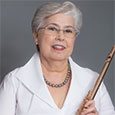
Being a professional musician is a wonderful but demanding profession. There is much to be gained whether one decides to become a professional or just learns to play for one’s own enjoyment. In Thomas Sudhof’s acceptance speech for the Nobel Prize in Medicine in 2013, he remarked, “I credit my musical education with my dual appreciation for discipline and hard work on the one hand, and for creativity on the other. I think trying to be marginally successful in learning how to be a musician taught me how to be a scientist: there is no creativity if one does not master the subject and pay exquisite attention to the details, but there is also no creativity if one cannot transcend the details and the common interpretation of such details, and use one’s mastery of the subject like an instrument to develop new ideas.”
Concentration
Concentration is one of the most difficult skills to master, yet when accomplished is one of the most rewarding. People are not wired to concentrate for long periods of time and studies have found that the mind tends to wander after seven or eight seconds. How do we do our best when our minds turn to something else? There is a wonderful story about a great jazz tenor saxophone player of the 1950s. That generation of musicians drank a lot. One evening someone went up to the saxophone player and asked how he played so well when he was drunk. His answer was, “Simple, I practice drunk.” While I am not advocating practicing or performing drunk, the lesson is this – always practice with the same concentration as you would give in a performance. This is true when warming up, practicing scales, arpeggios, long tones, chunking, etc. Every time you pick up the instrument there is an opportunity to practice doing your best. Giving full concentration to what you are doing time after time becomes a habit and will eventually become the way you live your life and approach other disciplines.
Slow Practice
I am a strong advocate of slow practice. It is difficult as a young person to imagine that taking the time to play things slowly (which can seem boring) is actually the fastest way to playing things well up to tempo. The legendary flutist and teacher Thomas Nyfenger used to say, “If you always play the passage correctly, you will always play the passage correctly.” The best way to insure playing correctly is regular slow practice. Itzhak Perlman said whenever he is asked for an autograph, he signs his name and then writes practice slowly.
Strive for Your Best
Learning to try your best at all times is one of the greatest gifts of learning music. The reward is not only fulfillment in the performance, but it also becomes a habit in life. Please note that striving to do one’s best is not the same as striving for perfection. Perfection is wonderful as a goal and as an achievement; however, it is important to know that perfection is rarely attained. However, always trying one’s best is an admirable attribute in any profession.
Robert Merrill, the great operatic baritone, commented that his colleague and friend tenor Richard Tucker went for a home run at every performance. Tucker’s feeling was that people came to the opera to hear the performers at their best and nothing less. I never had the pleasure of meeting or working with Richard Tucker, but from what I have observed from his family, friends and colleagues, it appears that he tried his best in every aspect of life. He was very much loved and respected.
On one of the very first orchestral auditions I took, I was asked to play the Mendelssohn Scherzo from the Midsummer Night’s Dream. Midway through the excerpt, I got a little tangled up but kept going until the end. Despite that, I was invited to the final round. Although I did not win the audition, the personnel manager came up to me and said he thought I would eventually win a major first flute position. I had done my best and had clearly made a good impression.
The personnel manager had also done his best by seeking me out to give me that very affirmative comment. As a young person just beginning in the profession, that action, as well as the comment, was enormously important in how I saw myself. It was also a wonderful example and one I have followed. I have always made a point to be positive with students and colleagues. When I was on audition committees at the Metropolitan Opera, I went out of my way to find the people who had impressed me and let them know. Often they told me years later that it had changed their lives.
During my first lesson with Harold Bennett (which was shortly after he had retired as principal flutist with the Metropolitan Opera), he said, “You want to be the best flutist; I want to be the best teacher.” What a wonderful example to give a young person.
It is important to go for those home runs in everything we do: how we present ourselves, from how we look to how we act, to of course, how we play. All of these things affect each other. How one’s life is lived will make a difference in how we are perceived. Making the effort to do your best is always recognizable and always appreciated.






